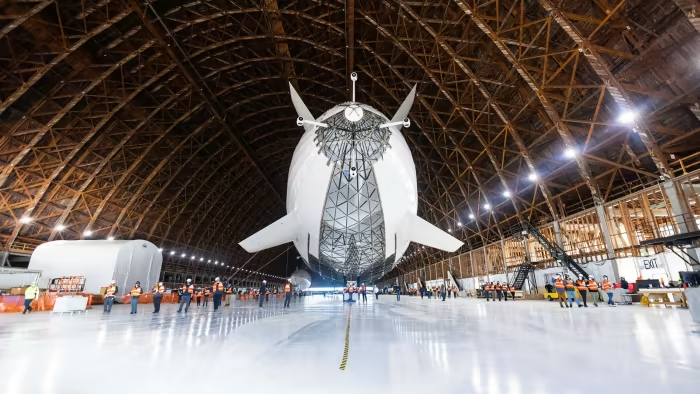Tim Bradshaw in London JUNE 3 2022
Google co-founder Sergey Brin’s secretive project to build huge electric airships is scaling up rapidly, as Lighter Than Air (LTA) Research prepares its first major test flights later this year.
The tech billionaire is hiring hundreds of aerospace engineers in Silicon Valley and Akron, Ohio, at a site made famous by the Goodyear blimp, to build airships intended to run humanitarian missions to remote areas or disaster zones.
LTA was incorporated in 2014, before Brin stepped down from executive duties at Google’s parent company Alphabet in 2019. The start-up’s headquarters are at Moffett airfield in the San Francisco Bay Area, a Nasa-owned facility a short drive from Google’s headquarters that the US space agency began leasing to the tech company in 2015.
LTA’s payments to Google for the use of Moffett have risen more than tenfold in the past three years, according to parent company’s Alphabet’s most recent annual proxy filing, which has disclosed the “arm’s length” transactions with Brin’s company since 2017.
After starting at just $131,000 five years ago, those payments rose from $1.1mn in the year to March 2019 to $10.9mn in the most recent period ending in March 2022, suggesting that LTA is accelerating its development.
LTA hopes to reinvent the blimp for the 21st century with “zero-emissions” flights. The company’s first full-sized airship, the 120-metre-long Pathfinder 1, is scheduled to begin test flights over Silicon Valley this year.
An even bigger dirigible, Pathfinder 3, is in development at the air dock in Akron, which became the world’s largest building when it was completed in 1929 and remains one of the world’s largest aerospace facilities today. A recruitment drive in Akron will double LTA’s total headcount to more than 400 people over the coming months.
Alan Weston, a former Nasa programme director who has led LTA since 2016, told local news reporters in Ohio in May that the company was building “the largest air vehicle on earth” in Akron. The 185 metre-long Pathfinder 3 will eventually be capable of carrying up to 96 tons across a range of up to 10,000 miles, or 16,000km, when it is completed next year, Weston said.
Pathfinder 3 is 60 metres shorter than the ill-fated Hindenburg-class airships that promised to revolutionise passenger flight in the 1930s until a disastrous accident in New Jersey killed 36 people and shattered the industry’s ambitions.
Brin’s day-to-day involvement at LTA is unclear but he is one of 13 inventors named on a key US patent granted to the company in April last year. The patent covers “methods and apparatus for constructing airships”, using 3D printing and carbon-fibre tubing to reduce costs and speed up production.
Weston said: “We believe lighter than air technology has the capacity to speed up humanitarian aid by reaching remote locations with little infrastructure, and to lower carbon emissions for air and cargo transportation.” Among the many open positions for which LTA is hiring is a “flight test engineer” in Silicon Valley with “experience with first flight efforts of experimental aircraft”. Advertised perks include free lunches, “swag and the occasional airship ride”.




